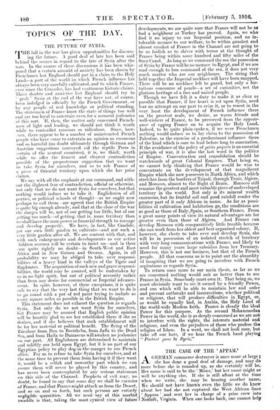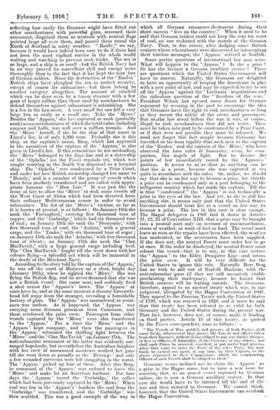THE CASE OF THE APPAM.'
AGERMAN commerce destroyer is once more at large ; : shehas done a good deal of damage, and may do more before she is rounded up, as she certainly will be, Her name is said to be the Mowe,' but her name might as well be anything else. If she is still afloat at the time when we write, she may be bearing another name. We should not have known even the little we do know about her had she not captured the West African liner Appam ' and sent her in charge of a prize crew into Norfolk, Virginia. When one looks back, one cannot help reflecting how. easily the Germans might have fitted out other merchantmen with Powerful guns, screened their armament, disguised them as neutiala- with neutral flags painted large all Over them, and passed them round the North of Scotland in misty weather. " Easily;" we say, because it would have indeed been easy to do if there had not been the most vigilant service in the whole world waiting and watching .to prevent such tricks. The sea is so large, and a ship is so small-4ut the British Navy has in no way proved its marvellous skill and energy more thoroughly than in the fact that it has kept the seas free of German raiders. Since the destruction of the ' Emden ' British ships haVe ploughed the sea in perfect security, except of course for submarines—but these belong to another category altogether. The amount of mischief which can be done even by a tramp steamer with a few guns of larger calibre than those used by merchantmen to defend themselves against submarines is astonishing. She is a fox in the hen-roost. A very small fox can kill a very large hen as easily as a small one. Take the Mowe. Besides the Appam,' she has captured or sunk (probably sunk) seven merchantmen of which the total value, including cargoes and hulls, was well over a million pounds. And the Mowe ' herself, if she be the ship of that name in Lloyd's list, is of only .1,200 tons. Probably she is this ship,' as the captain's name, Berg, which has appeared in the narratives of the capttire of the Appam, is also given in Lloyd's list. If this coincidence be not misleading, the Miiwe belonged to the Argo line and is a sister-ship of the Ophelia ' (so the Times reminds us), which was 'caught scouting in the North Sea disguised as a hospital ship. The Ophelia ' was condemned by. a Prize Court, and under her new British ownership changed her name to Huntly,' and is a member of the group of vessels which have been similarly transferred and are called with appro- priate humour the " Hun Line." It was just like the irony of fate to allow the Mowe ' to sink some vessels off the West Coast of Africa which had been diverted from their ordinary Mediterranean course in order to avoid submarines. The list of the lawe's ' victims, so far as it is known at present, is as follows : On January 10th she sank the Farringford,' carrying five thousand tons of copper, and the Corbridge,' which had six thousand tons of coal ; on January 13th she sank the Dromonby,' with five thousand tons of coal, the Author,' with a general cargo, and the Trader,' with six thousand tons of sugar ; on January 15th slie sank'the Ariadne,' with five thousand tons of wheat ; on January 17th she sank the Clan MacTavish,' with a large general cargo including beef. The Clan MacTavish' fought till she went down with her colours flying—a splendid act which will be immortal in the deeds of the Merchant Navy.
According to the story told by the captain of the ' Appam,' he was off the coast of Morocco on a clear, bright day (January 16th), when he_ sighted the . Mowe." She was flying the British .flag, and he. never dreamed that she was not a British vessel. She came near, and suddenly fired a shot across the Appaints ' bows. The Appam ' at once hove to, and at the same momenta dummy forecastle- head fell away from the stranger, revealing a formidable battery of guns. The Appam ' was surrendered, as resist- ance was useless. As it happened, the Appani ' was carrying some German prisoners from Cameroon, and these reinforced the prize crew. Passengers from other vessels captured by the ' were also transferred to the Appam.' For a time the Mow° '• and the Appam ' kept company, and then the passengers in the, Appam witnessed the thrilling fight between: the MOwe and the Clan MacTavish ' on January 17th. The anti-submarine armament of the latter was evidently out- ranged hopelessly, but nevertheless the Australian freighter with her crew of unseasoned amateurs worked her guns till she went down as proudly as the Revenge' and only a few wounded survivors were left struggling in the water. The Appam ' picked up four of, these. After this Berg, in command of the_ .Appam,' was ordered to leave the Mowe ' and make for an American harbour. For four days the Appam ' towed the Corbridge,', the collier- which had been previously captured by the .lYltitve.'. When coal was. low in the Appam-s ' bunkers the coal from the Corbridge ' was transferred; and the Coibridge Was- then scuttled. This was -a. good exitinple• tif.the -*ay la which all German commerce-destroyers during, their short careers " live on the country." When it used- to be Said that German raiders could not keep the seas for want of coal, no one reckoned with the morals of the German Navy. Thus, in due course, after dodging some British cruisers whose whereabouts were discovered by intercepting their wireless messages, the Appam ' arrived at Norfolk.
Some pretty questions of international law now arise.
What will happen to the Appam ' Is she a prize ? Or has she become a German auxiliary cruiser ? These are questions which the United States Government will have to answer. Naturally, the Germans are delighted to have an opportunity of keeping the Americans in play with a new point of law, and may be expected to try to set off the Appam ' against the Lusitania negotiations and the ridiculous question of the " freedom of the seas." President Wilson has opened some doors for German argument by seeming in the past to encourage the idea that Germans have the right to sink merchantmen so long as they secure the safety of the crews and passengers. But as .the law stood before the war it was, of course, illegal to sink merchantmen that did not resist. They must be -taken into port to be condemned by a Prize Court., or if that were not possible they must be released. We need not forget this fact simply- because Germany has travelled so far from legality that such men as the captain of the Emden' and the captain of the Mowe; who have observed the bare rules of humanity, seem, by com- parison, like angels of light. But to discuss the points of law immediately raised by the .Apparn's ' • position. It seems to us as clear as anything can be that she is a prize, because she was captured at sea quite in accordance with the rules. Or, rather, we should say that she is on her way to become a prize, for strictly a prize can be condemned only in a port belonging to the belligerent country which has made the capture. Till she is thus " condemned " the Appam ' is not technically a prize in the eyes of the law. And yet, as she is still less anything else, it seems only just that the United States Government should treat her as a vessel on her way to become a prize. The law in this case is clear enough: The Hague delegates in 1907 laid it down in Articles 21, 22, 23 of Convention XIII. that a prize may be brought into a neutral port only on account of unseaworthine-ss, stress of weather, or want of fuel or food. The vessel must leave as soon as the repairs have been effected, the weather has moderated, or the necessaries have been supplied. If she does not, the neutral Power must order her to go at once. If the order be disobeyed, the neutral Power must release the vessel—that is to say, in this case restore the Appam to the Elder, Dempster Line—and intern the prize crew. It will be very difficult for the United States to ignore this rule. Naturally Herr Berg has no wish to sail out of Norfolk Harbour, with the anti-submarine guns (if they are still mounted) visibly proclaiming their inadequacy, because he knows that British cruisers will be waiting outside. The Germans, therefore, appeal to an ancient treaty which was, in our judgment, abrogated by the Hague Convention of 1907. They appeal to the Prussian Treaty with the United States of 1799, which was renewed in 1828, and it-must be said that this treaty has been referred to as valid by both Germany and the United States during the present war.
That fact, however, does not, of course, make it binding on third parties. Article 19 of this treaty, as quoted by the Tinics correspondent, runs as follows :- " The Vessels of War, public'~ and private, of both Parties shill carry freely, wheresoever they please, the Vessels and effects taken from their hiemies, without being obliged to pay any duties, charges. or fees to Officers of Admiralty, of the Customs, or any others ; nor shall such Prizes be arrested, searched, or put under legal process. when they come to enter the Ports of the other Party, but mw freely be carried out again, at any time, by their Captors, to tItt • places expressed in their Commissions, which the commanding • Officers of such Vessels shall be obliged to show."
Germany seems inclined not to claim the Appam '• as a prize in the Hague sense, but to raise a new issue by... asserting that, as an armed vessel captured by G3rnian sailors, she is now a German auxiliary cruiser. In that Case she -would have to be interned till the end of the war and then restored to Germany: We .cannot think, . however, that' the United-States Government can overinok - the Hague Convention:



































 Previous page
Previous page